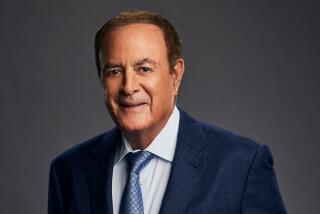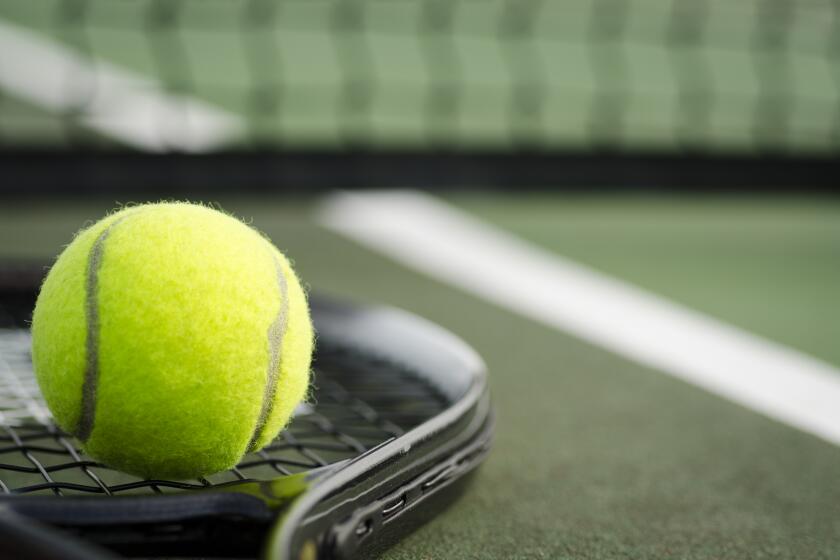‘Air That Speaks’ : Announcer Uses Turns of Phrase and Ancient Mythology to Broadcast Basketball in Navajo
- Share via
WINDOW ROCK, Ariz. — When the evening light starts to fade from the sky above the vast plains and mesas of the Navajo Reservation, people hurry to finish their meals and pen up their livestock for the night.
Then, in hogans built from logs and earth, they gather around battery-powered radios and listen raptly as a faraway voice excitedly likens the exploits of 10 athletes to the deeds of the Monster Slayers, twin heroes of ancient Navajo mythology.
But these modern-day Monster Slayers have names that sound foreign to Navajo ears--names like Charles Barkley and Kevin Johnson.
While the rest of America watched the NBA playoffs on TV, Navajos for the first time heard Phoenix Suns basketball games broadcast in their own language.
And it came live to them from announcer Kenneth Maryboy, a 31-year-old apprentice medicine man with a genius for describing the breakneck action of an NBA game in the elaborate, lyrical vocabulary of a people who had little contact with Western ways until the 19th Century.
“It was said that it could never be done,” Maryboy says. “There were no such words in Navajo to explain basketball.”
The live broadcasts--possibly the first professional sporting events ever carried in an American Indian language--were the brainchild of the managers at KTNN, the tribally owned radio station in Window Rock.
The Suns are getting extra attention this year because they have made it to the league championships. If sponsors are found, the station will carry the final round of games.
Navajo speakers from as far away as San Francisco and Idaho were able to hear the broadcasts because KTNN’s 50,000-watt signal, which blankets the 24,000-square-mile reservation covering three states, travels much farther at night, according to program director Michael Moore.
“People are calling us from everywhere asking us, ‘What are you guys going to do next?’ Here they are, hearing their native tongue describing something that’s in the white world,” says Moore.
“Pretty much everybody is into this,” he says. Older Navajos, who may not speak English, are especially pleased to hear the games in their own language, even if they’ve never seen a basketball game, he says.
The radio--referred to in Navajo by a phrase meaning “air that speaks”--is the primary form of mass communication in a region where many homes still lack electricity or telephones. Not surprisingly, KTNN’s basketball broadcasts--which started in April--are drawing a big audience.
During recent games, the station has set up a large-screen TV outside its offices, replacing the English soundtrack with its own Navajo-language commentary. Hundreds of people have been showing up, driving in from all over the reservation.
The Phoenix Suns organization, likewise, is happy with the arrangement. Players Charles Barkley, Kevin Johnson and Dan Majerle have taped station-identification spots for KTNN in English.
*
Much credit for this radio success story goes to Maryboy, who lives near Bluff, Utah, in the southeastern part of the state. He draws on his experience as a rodeo announcer and his familiarity with traditional Navajo stories when doing play-by-play.
Navajo, full of sibilants and glottal stops, is related to Apache dialects as well as Athabaskan languages spoken in Alaska, Canada and the Pacific Northwest. It is the language of a pastoral culture that has no vocabulary to describe many aspects of modern society.
For example, when referring to 6-foot-6 Barkley, the Suns’ dominating star player, Maryboy uses a Navajo title that means, in Maryboy’s words, “the big, big provider--the head, sort-of-a-chief guy.” The term aptly describes Barkley’s contribution to the Suns since he was traded from Philadelphia last season.
Maryboy also will allude to a well-known Navajo story to explain a situation to his listeners.
“The other day, Charles Barkley was kind of down,” Maryboy says. “They thought he was going to be out of the game because he sprained his ankle. I mentioned how one of the (Monster Slayer) twins had fallen, but along the way he regains his strength.”
Seated court-side amid 19,000 screaming Suns fans at America West Arena in Phoenix, Maryboy has help from two production assistants who track statistics and tape interviews with players and coaches.
He must find words to describe dunks, jump shots, personal fouls, turnovers and dribbling, sometimes resorting to archaic vocabulary that many Navajos don’t readily understand. Nevertheless, he declares, “Every one of these are being described in Navajo.”
When translating team names, Maryboy doesn’t have much trouble with the Suns, but the SuperSonics, who were eliminated by Phoenix on Saturday, posed a problem. He tried one term that meant “tornado” to some of his confused listeners.
*
At the start of each game, Maryboy identifies the players by number and English name, but then he translates each player’s surname into Navajo. In Barkley’s case, he settled on a pun, using the Navajo word that refers to dogs barking.
Barkley apparently doesn’t mind.
“I personally met him in the locker room,” Maryboy says. “He’s really a nice person. It’s just that he’s different out on the court.”
Because the Suns will play the Chicago Bulls for the championship--starting Wednesday--Maryboy gave a lot of thought to how he will describe Michael Jordan, the most visible athlete on the planet.
“His name is ‘Air Jordan,’ so I call him the guy that walks the air,” he says. There is, he explains, a character in an old Navajo story who shares Jordan’s gravity-defying abilities.
As someone who has embarked on a decades-long process of immersing himself in traditional Navajo religion, Maryboy sometimes surprises himself with his translation skills.
He recalls seeing a Phoenix TV station’s report about his work. “It was really interesting that I could describe something in Navajo that fast,” he says. “It sounds like you’re listening to an auctioneer.”
*
The flash and glitter of NBA basketball seems an eternity removed from Maryboy’s life in rural Bluff.
He lives with his wife and four children in a small settlement six miles from town. For each Suns home game, he hops into his red Mazda pickup and drives 3 1/2 to 4 hours southeast to Window Rock, the Navajo tribal capital, to pick up his equipment. From there it’s another 5 1/2 to 6 hours southwest to Phoenix.
Maryboy’s youngest daughter, age 2 1/2, misses her father--a self-described Mr. Mom--when he’s on the road, he says. But she gets a kick out of hearing him on the radio.
KTNN’s Michael Moore says he discovered Maryboy’s abilities while visiting the Navajo town of Chinle, Ariz., to broadcast from a Monster-Truck-like show in which cars and trucks slopped through a mud bog. He sat next to Maryboy, who was emceeing the event.
“He had the crowd rolling on the ground, looking up at the booth waiting for his jokes,” Moore recalls. “I went, ‘Whoa, this guy’s good--just a natural talker.’ ”
Moore urged Maryboy to consider broadcasting, but Maryboy didn’t take him up on it until recently. He joined KTNN this spring, just after the station broadcast the state basketball championships in English and Navajo for the first time.
“That’s where we got the whole idea,” Moore says. “Someone in the Suns organization knew that we had done that, and that made it easy to sell them on it.”
Meanwhile, Maryboy has been contacted by members of an Athabaskan-speaking tribe in Saskatchewan, who would like him to come for a visit.
It seems they want his advice about broadcasting a popular local sport, something called ice hockey.
More to Read
Go beyond the scoreboard
Get the latest on L.A.'s teams in the daily Sports Report newsletter.
You may occasionally receive promotional content from the Los Angeles Times.










